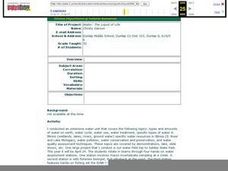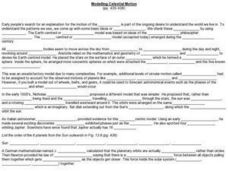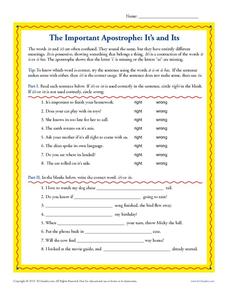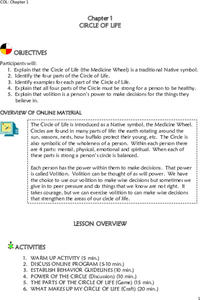Curated OER
"Space" Investigations
Sixth graders understand the patterns of change observable on Earth as a result of the movement of the different bodies in the solar system. They identify the physical characteristics of the different components of the solar system.
Curated OER
Movement of Air
For this air worksheet, students identify polar easterlies, prevailing westerlies, and trade winds on a Earth diagram. This worksheet has 13 fill in the blank questions.
Curated OER
Storms - What am I?
In this earth science worksheet, students use the clues to determine each of the stormy words in the puzzle. There are nine clues listed on the sheet.
Curated OER
Water: The Liquid of Life
Sixth graders complete a lesson on the properties, types and amounts of water on Earth. In groups, they travel between stations to identify water resources in Illinois and pollution sources. They complete the lesson with a field trip...
Curated OER
DASH Sunrise and Sunset/ Seasons Chart
Second graders rotate as the person to enter the information of sunrise and sunset into a spreadsheet. The teacher also demonstrates how to convert the spreadsheet into a chart.
Curated OER
Weather Instruments
Third graders practice making predictions about weather from conditions they observe on weather instruments and weather reports. Learners are introduced to the most basic weather reporting instruments: the thermometer, the wind vane, the...
Curated OER
Geographic Effects on Precipitation, Water Vapor and Temperature
Students investigate the factors affecting climate using Live Access Server. In this geography lesson, students graph atmospheric data using Excel spreadsheet. They compare and contrast temperature, precipitation and water vapor of two...
Curated OER
Modeling Celestial Motion
In this modeling celestial motion instructional activity, students fill in the blank about the motion of celestial bodies: planets and stars. Students complete the blanks with information about the scientists and philosophers responsible...
Curated OER
Modeling Day and Night
Students complete a science experiment to study the role of night and day on sleep patterns. In this sleep patterns lesson, students brainstorm about night and day and the causes for the rotations on Earth. Students work in groups to...
Curated OER
Foucault's Pendulum
Students explain how the motion of the Foucault pendulum proves that the earth is rotating.
Curated OER
How Does the Moon Move?
In this moon worksheet, students will fill in the blank of 6 statements relating to how the moon rotates around the Earth including the phases of the moon.
Curated OER
Planet Cards
In this science card activity, learners cut out the different cards and study the planets Earth, Venus, Mercury, Saturn, Jupiter, Mars, Pluto, Neptune, and Uranus. Students' objective is to learn each planets' orbit, rotation, distance...
Bowels Physics
Methods of Motion
How could you earn a $6,000,000 speeding ticket? This presentation uses an analogy that relates speed in the universe to the cost of a speeding ticket. Scholars ultimately understand that motion is relative. Also covered is the concept...
Curated OER
The Solstices
Compare surface temperatures when the solstice occurs in the different hemispheres. Young scientists draw conclusions from their investigation of data collected using spreadsheets and a globe.
It's About Time
A Moving Frame of Reference
We often remind pupils to cite their references, but this lesson helps them understand there are many frames of reference. Scholars experiment with throwing a ball straight up in the air and catching it. Then they must do it again while...
Curated OER
True North, Magnetic North
Students explain why compass angles need to be corrected for regional magnetic variation. They observe the difference between magnetic and true north. Each student measures the angle of variation for a town in a different state.
NOAA
A Laboratory Simulation of Ocean Surface Currents
Stimulate interest in ocean currents with a simulation. The first installment of a five-part middle school series teaches future oceanographers about the forces that interact to cause ocean currents. A simulation shows how wind and the...
Curated OER
Storms and Extreme Weather
Students explore hurricanes and tornadoes by conducting an experiment. In this weather pattern lesson, students define many extreme weather vocabulary terms and discuss the relationship with static electricity. Students utilize plastic...
Curated OER
Complex Sentences: Sentence Combining
Set up your learners to become master sentence combiners with this sentence combining activity! There are 3 columns on this resource. Writers merge simple sentences from the first column and second column using the clue provided in the...
Curated OER
Moon Phases
Five multiple choice questions are provided in the handout about the phases of the moon. A digaram is included to help astronomy learners answer the questions. The diagram is meant to represent the appearance of the moon from the...
Curated OER
Weather Instruments
Third graders make predictions about weather and utilize weather instruments and weather reports. They match weather components with weather instruments, and demonstrate how to read a thermometer. Students also construct and use a wind...
K12 Reader
The Important Apostrophe: It's and Its
Help class members distinguish the difference between its and it's. As individuals read sentences and determine if the use of the two words are correct or incorrectm they fill in the blanks of sentences with the appropriate it's or its.
Healthy Native Youth
Chapter 1: Circle of Life
Volition, or will-power, is the focus of a instructional activity that brings forth the Native symbol, the Circle of Life, to instill the importance of responsible decision-making. Scholars take part in six activities that empower them...
Curated OER
Tide Types
Students record hourly reading for water height for 24 hours and determine whether a location experiences diurnal, semi-diurnal or mixed tides. Links are present for the information. Students predict high and low tide, and answer a set...

























